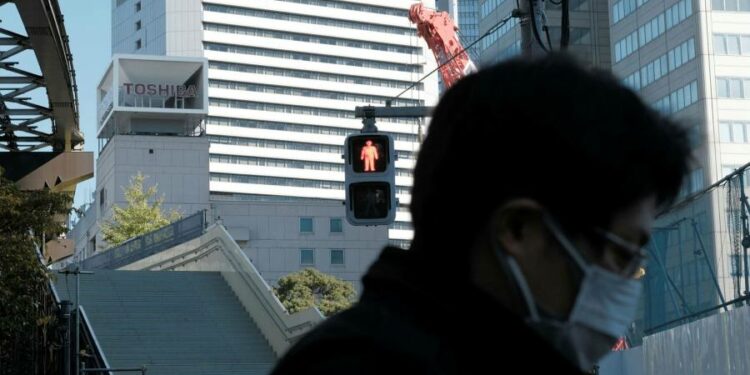Toshiba on Monday scrapped a contentious plan to split into three companies and offered an alternative proposal to break into two groups, sending its shares higher as it pledged to increase shareholder returns threefold.
Under the new plan, the industrial conglomerate’s devices business, including semiconductors, is expected to be spun off and listed as one company. The infrastructure business is set to remain under Toshiba.
The tech giant also said it wanted to bolster shareholder returns to ¥300bn ($2.6bn) in the next two years, up 200 per cent from its previous target of ¥100bn.
The Japanese conglomerate, which bet big on a nuclear-powered future that never materialised, said the latest plan would make the break-up of the company cheaper and simpler.
Toshiba’s chief executive officer Satoshi Tsunakawa told investors the company had asked memory-chip business Kioxia, in which Toshiba holds a 40.6 per cent stake, to list as soon as possible. Toshiba is also exploring a potential stake sale.
Toshiba shares rose about 4 per cent immediately after the announcement, with the stock ending the day about 2 per cent higher. Shares of Toshiba Tec, the company’s listed electronic equipment maker, closed 14 per cent higher after Tsunakawa said it no longer formed a part of its core business.
But analysts said the plan could face pushback from some overseas hedge funds that would rather see the company taken private.
The two-way split “makes the deal more digestible and easier to execute and should provide quicker return in value for shareholders. It captures obvious and easy low-hanging fruit,” said Damian Thong, tech analyst at Macquarie in Tokyo.
Adding to the push to boost shareholder returns and speed up business divestitures, Toshiba said earlier on Monday it would sell 55 per cent of its 60 per cent stake in Carrier Global, an air-conditioning joint venture, to its US partner for $870mn. Toshiba will also start the process of selling its lighting and elevator business.
People close to three private equity companies said they had received contact from bankers within the past two months for discussions regarding the potential sale of non-core Toshiba assets.
Late in 2021, shareholders who collectively held more than 30 per cent of Toshiba’s stock told the Financial Times that they would vote against the three-way split if given the option.
Toshiba’s restructuring plan came after private equity group CVC proposed taking the company private last year. After the resignation of Toshiba’s then chief executive in April and a bruising annual meeting in June, the company convened a strategic review committee to examine its options.
The review concluded that after an accounting scandal, a brush with bankruptcy and the sale of its prized memory chip business, Toshiba’s best option was to split itself into an electronic devices business, an infrastructure group and a holding company for its remaining interests in semiconductors.
But large investors accused the review committee of deliberately downplaying the viability of a private equity buyout of the entire company.
Tsunakawa on Monday denied that scrapping the three-way split plan was caused by the backlash from investors. The new plan will be set in motion if it gets a simple majority at an extraordinary shareholders meeting in March, with the date to be announced.











